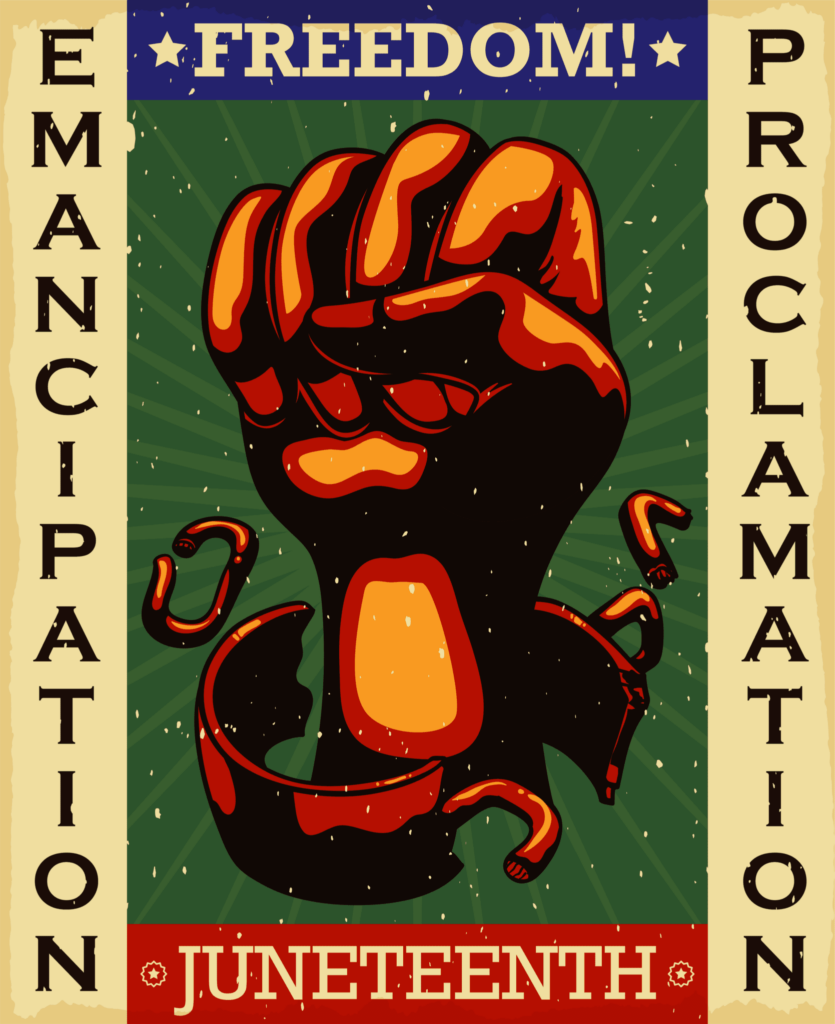Juneteenth, the official freeing of enslaved people on June 19, 1865, in Texas, is one of the most important events in American history — but most students haven’t even been taught it. Maybe that will change now that Juneteenth is a national holiday. It makes sense to acknowledge the day when Union troops arrived in Galveston a full two and a half years after President Lincoln signed the Emancipation Proclamation — it is the start to remedying one of this country’s darkest sins. However, it also sets in motion the maintenance of Black subordination in the country’s postbellum society. Yes, Black people were no longer enslaved, but new laws ensured that they would still have to work to support plantation owners instead of enjoying the benefits of landownership themselves. This has had lasting effects, influencing even today’s wealth inequality. That, too, should be acknowledged.
Critically examining Juneteenth in this way is representative of the foundational principle behind critical race theory and the sort of anti-racist teaching that Ed Trust advocated for in January after the insurrection at the Capitol. Schools offer an important opportunity to instill this critical lens in a future generation of students tasked with ensuring that the racial progress we’ve made over the past 155 years continues to strengthen our country.
Yet, more than 20 states are moving to strike aspects of American history and anti-racist teaching from public school curricula. Their argument is that examining our history of racism breeds contempt that is racially divisive. On the contrary, discussing history truthfully and using its lessons to inform our future breeds empowerment and is racially unifying. Instead of seeding anger and blame, it allows us to approach solutions to current and future problems with the greatest insight and it helps build trust and accountability within our systems.
Knowledge of our history is essential to inform solutions to future problems
The COVID-19 pandemic and its impact on every aspect of our life has been a generational event in our nation’s history. Mass vaccination efforts have been among the most effective solutions for our country’s return to relative normalcy, but vaccination rates have slowed. Understanding what motivates Black people to obtain the vaccine and tying incentives to those motivations is a vital policy solution toward reaching the herd immunity necessary to curb the pandemic. Black people, on average, have lower vaccination rates than their White counterparts. Policymakers who are ignorant of racist practices in healthcare in our nation’s history may dismiss the possible reasons behind Black people’s distrust of healthcare systems.
From 1932 to 1972, the United States Public Health Service and the CDC conducted the Tuskegee Study of Untreated Syphilis in the Negro Male on hundreds of Black men in the South. The study had horrendous effects on the participants, as they were purposely infected with syphilis and withheld from treatment. This, along with many other instances — from Henrietta Lacks in the 1950s to the NFL “race-norming” tactics of today — shows that healthcare abuse of Black people has created in many of them a deep-seated, persistent mistrust of healthcare systems in the U.S.
The only way to create policies and invest in effective strategies is to have a full picture of the historical conditions that led to the systems and outcomes we see today.
Knowledge of our history is necessary for accountability – not retribution or atonement
The 2020 murder of George Floyd at the hands of the police and the subsequent protests were seminal moments in our nation’s most recent history. The outrage that followed was partially toward the depraved indifference of the now-convicted murderer himself, Derek Chauvin. But we’ve seen multiple instances of police brutality caught on tape over the past few decades that have not caused this same reaction.
Instead, most of the outrage was toward a justice system that has rarely held the police accountable for the deaths of the people of color. The Los Angeles Riots of 1992 were not incited by the release of the footage of Rodney King being savagely beaten, but by the “not guilty” verdicts handed down to White police officers who escaped punishment for taking actions that Black people had seen for years in their own communities and were finally caught on tape for the world to view.
Without a clear understanding of what led to these boiling points through an examination of history, we cannot create systems of accountability that are strong enough to maintain order. Studying history does not involve retribution, revenge, or atonement. It involves an understanding of why one inciting event can lead to such outrage and mistrust that we need to examine the efficacy of the system itself.
That’s what anti-racist teaching does: It doesn’t retroactively place blame on the perpetrators of negative acts. Instead, it examines the role of different systems in allowing repeated negative acts and offers solutions to strip away some of the negative relics of the system that causes these acts to occur. In this case, it’s examining the criminal justice system’s history of police brutality in Black communities and adjusting laws and policies that intentionally targeted these communities, while holding wrongdoers accountable in the moment.
Knowledge of our history is empowering and can shift entire narratives about people
Last month, the White House commemorated the 100th Anniversary of the Tulsa Massacre, during which a White mob burned down the Black community of Greenwood in Tulsa, Oklahoma, with impunity, killing hundreds and leaving thousands homeless. And most of our country was surprised to learn about it this year
Learning history can be extremely empowering: It provides a portal into what we can achieve, while helping us put current, often negative conditions into better context. It also provides a crucial opportunity to change the narrative for entire populations of people. Without knowing that Black communities thrived until explicit violence, terror, and racism destroyed them, one may believe that the current outcome disparities we see between races is due primarily to an inherent flaw or problem of Black people themselves.
Much like the renewed conversation about the Tulsa Massacre, Juneteenth is the next opportunity for Americans to unite under a common mission to learn from our past and use it to improve our future. U.S. history is not divisive — rather it can unite all of us in a common mission to address our issues with racism to form a union that is far from perfect, but still has a plethora of potential.







